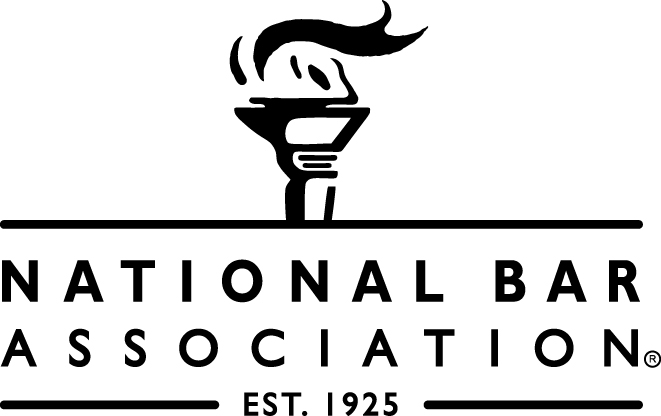NATIONAL BAR ASSOCIATION
THE HISTORY OF THE NATIONAL BAR ASSOCIATON

Legions of African-American lawyers affiliated with the NBA ushered in the rule of law through the turbulent 1920’s and 1930’s. R.D. Evans, for example, who later became a member of the NBA, tried the first case in Waco, Texas to prevent the Democratic Party from forbidding “colored people” to vote in election primaries in 1919. From the 1920’s through the 1950’s, African-American lawyers such as the Honorable James A. Cobb, T. Gillis Nutter, and Ashbie Hawkins fought the famous segregation case of Louisville and the Covenants case of The District of Columbia. Early NBA pioneers S.D. McGill, R.P. Crawford, and J.L. Lewis fought to have sentences of execution stayed in the Florida case popularly referred to as the “Four Pompano Boys.” Wherever there was a fight to wage in defense of the rights of Blacks and poor people, the NBA was there.
In 1940, when the number of African-American lawyers barely exceeded 1,000 nationwide, the NBA attempted to establish “free legal clinics in all cities with a colored population of 5,000 or more.” The NBA was ahead of the “War on Poverty” programs of the 1960’s, which gave birth to federal legal aid to the indigent.
Members of the NBA were leaders of the pro bono movement at a time when they could least afford to provide free legal services and before poverty law became profitable. When the Supreme Court outlawed school segregation in Brown v. Board of Education the NBA was only 25 years old. This decision culminated a long struggle by African-American lawyers. Thurgood Marshall, the first African-American United States Supreme Court Justice, and United States District court Judge Constance Baker Motley, the first African-American female federal judge, are two outstanding jurists who helped make Brown v. Board of Education a pivotal case in American Civil Rights history. Through continuing service, the NBA has become known as America’s legal conscience.
For the NBA, 1978 – 1979 proved to be the “Year of Affirmative Action.” In the wake of Bakke v. Regents of the University of California, the organization addressed pressing issues laid bare by this momentous decision. The NBA gained international recognition for efforts on behalf of the disenfranchised and politically oppressed people of the world. March of 1981 saw the first NBA Legislative Conference. The 1981 – 1982 bar year commenced on a historical note: Arnette R. Hubbard assumed leadership, making her the first woman president of a major bar association.
In May 1982, the NBA named its mid-year dinner in honor of Gertrude E. Rush, the organization’s only woman co-founder. The Gertrude E. Rush Award Dinner past honorees include: Ret. Gen. Julius Becton; Thomas Berkley, Esq., publisher of California’s Post Newspaper; Hon. Jane Bolin, the nations first African-American woman judge; poetess Gwendolyn Brooks; Hon. Willie L. Brown, Jr., Mayor of San Francisco; Hon. Shirley Chisholm; Johnnie L. Cochran, Jr., Esq.; Hon. George W. Crockett, Jr.; Major General (Retired) Kenneth Gray; Rev. Jesse Jackson; Hon. Maynard H. Jackson; Hon. Barbara C. Jordan; Hon. Kweisi Mfume; Hon. Charles B. Rangel; Hon. Rodney Slater; Hon Maxine Waters; and Hon. L. Douglas Wilder. In 1986, the NBA Hall of Fame was inaugurated by then President Fred D. Gray, Sr. to honor those lawyers who have been licensed to practice for forty years or more and who have made significant contribution to the cause of justice. Several prominent NBA members have been inducted into the Hall of Fame over the past few years. These inductees include: Hon. Louis Stokes; Cora T. Walker, Esq.; Hon. William Cousins, Jr.; and Hon. L. Clifford Davis.
The first Annual Wiley A. Branton Award Luncheon and Issues Symposium was held in Little Rock, Arkansas in 1989. The Symposium, established as a tribute to Wiley A. Branton, a stalwart in the Civil Rights arena, was first held in his hometown. Since 1989, the NBA has used this Symposium as an avenue to discuss pressing social, legal, and political issues affecting our communities. Wiley A. Branton Award Luncheon honorees include: Hon. Dennis W. Archer; Hon. James E. Clyburn; Marilyn Crawford; Fred D. Gray, Esq.; Hon. Eugene Hamilton; Dr. Dorothy Irene Height; Hon. Earl F. Hillard; Elaine Jones, Esq.; Tom Joyner; and Hon. Janet Reno; and H.T. Smith, Esq. In 1992, the NBA submitted comments to the proposed “incubator” program described by the Federal Communications Commissions (FCC) in its Memorandum Opinion and Order and Further Notice of Proposed Rule Making, FCC 92-361, released September 4, 1992. In that same year comments were also submitted in response to the Notice of Proposal Policy Guidance issued by the United States Department of Education and published in the Federal Register on December 1, 1991.
In 1996, the NBA submitted comments before the Federal Communications Commission (FCC) in the Matter of Streamlining Broadcast EEO Rules and Policies, Vacating the EEO Forfeiture Policy Statement and Amending Section 1.80 of the Commission’s Rules to Include EEO Forfeiture Guidelines. Also in 1996, the NBA submitted an amicus curiae brief in Sloan et al v. United States of America (Docket No. 96-8145) to the United States Court of Appeals for the Eleventh Circuit. The focus of this case was the racially disparate impact of the enforcement of the federal “cocaine base distinction.” At present, the NBA is the nation’s oldest and largest national association of predominately African-American lawyers and judges. It has 84 affiliate chapters throughout the United States and affiliations in Canada, the United Kingdom, Africa and the Caribbean. It represents a professional network of over 20,000 lawyers, judges, educators and law students.
Connect With Us On Social Media
